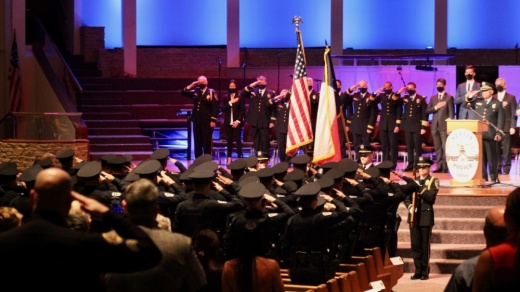City Council and those involved in the past year's training process gathered Feb. 15 to consider next steps for the police cadet academy that was rebooted last spring following an extended pause. Council's conditional vote to restart training last May came in the wake of broader commitments to public safety changes in Austin, an initiative described as on track but still with room for improvement.
"This process of rethinking our academy is one that we need to be continually engaged in, and there’s still very much work to be done. We have done a lot, and your staff and your cadets and your officers have made some significant changes, but I think there's still important work to be done," Mayor Pro Tem Alison Alter said.
In a briefing on the past year's cadet training, APD Chief Joseph Chacon described a process he said was at times bumpy and frustrating for instructors given external pressure and calls for significant change. But in the end, he said the 144th class was a relative success that sets up future academy sessions for further growth in areas such as diversity and inclusion, de-escalation, community relationships, and moving officers from a "warrior" to a "guardian" mindset.
“It’s been incredibly tough. Feelings of uncertainty, anxiety from our staff members just making sure that they were meeting the expectations," Chacon said. "We’d meet daily sometimes to talk about how individual classes went and the feedback. They were incredibly receptive to that feedback and want to improve; you can see the desire there to really make this a world-class academy.”
Community oversight, ongoing improvement
Training of the 144th class took place under evaluation by Kroll Associates, consultants hired by the city to keep an eye on APD's progress in updating aspects of its culture and rolling out recommended changes to operations and training. For the first time, the academy also involved two civilian review panels tasked with examining the police academy's curriculum and video materials. And a civilian division manager, Anne Kringen, was brought on to co-lead instruction and some reforms alongside APD leadership.
Mark Ehlers, engagement leader for Kroll's work with the city, commended APD for putting on its "overall excellent" eight-month academy despite several changes that are yet to take place. Among those is the success of the civilian review boards—now to be combined into a single body for future classes—which Ehlers and other participants have said did not reach their initial goals during the 144th.
"There was a feeling that perhaps this committee did not accomplish as much as it would have liked, quite frankly," Ehlers said.
Overall, APD has worked through most of Kroll's short- and long-term recommendations for academy improvements as of February. Still remaining are items such as the rollout of a mentorship program for new recruits, facility improvements at Austin's public safety training center, and incentives for cadet instructors.
Although Chacon said he was unaware of the issue taking place this year, he and council members also expressed concern over the possibility that newly graduated cadets had immediately left Austin's force for other departments after securing their law enforcement credentials here. He said he hopes to put a retention clause into future cadet contracts to avoid losing out on new officers at a cost of tens of thousands of dollars to the city.
'Setting the culture'
APD's 145th cadet class is in its recruitment stage, and that academy session could begin as soon as late March. Chacon also said he hopes to launch a smaller modified 146th academy this summer, a "transitional officer program" for experienced police seeking to transfer to Austin without needing a full eight-month introduction. The decision on when to start a 147th academy has yet to be made.
In closing comments during the mid-February discussion, council members reiterated they still expect more to be done on proposed reforms and buy-in from academy instructors at APD. But in general, they expressed appreciation for Chacon's willingness to adapt and begin correcting past worries about the academy, which halted training in 2020.
"I cringe every time I see ... this getting reduced to a conversation about delaying cadet classes as if there’s no benefit," Mayor Steve Adler said. "Certainly there is cost associated with that because we have now more unfilled vacancies than we would have if we didn’t delay the cadet class, and we’re working now to remedy that situation. But at the same time, we weren’t ready to have the classes go forward, and that's part of the disruptive nature of this.”
Chacon also committed to continuing the process sparked with the 144th class while noting foundational changes at APD will not happen overnight.
“Doing that in the academy for brand-new folks coming on and setting the culture is much easier than changing the culture within the department which has existed for a really long time. And that is something that I am still working on," Chacon said.





